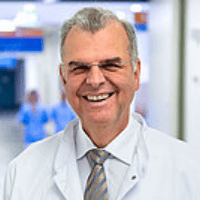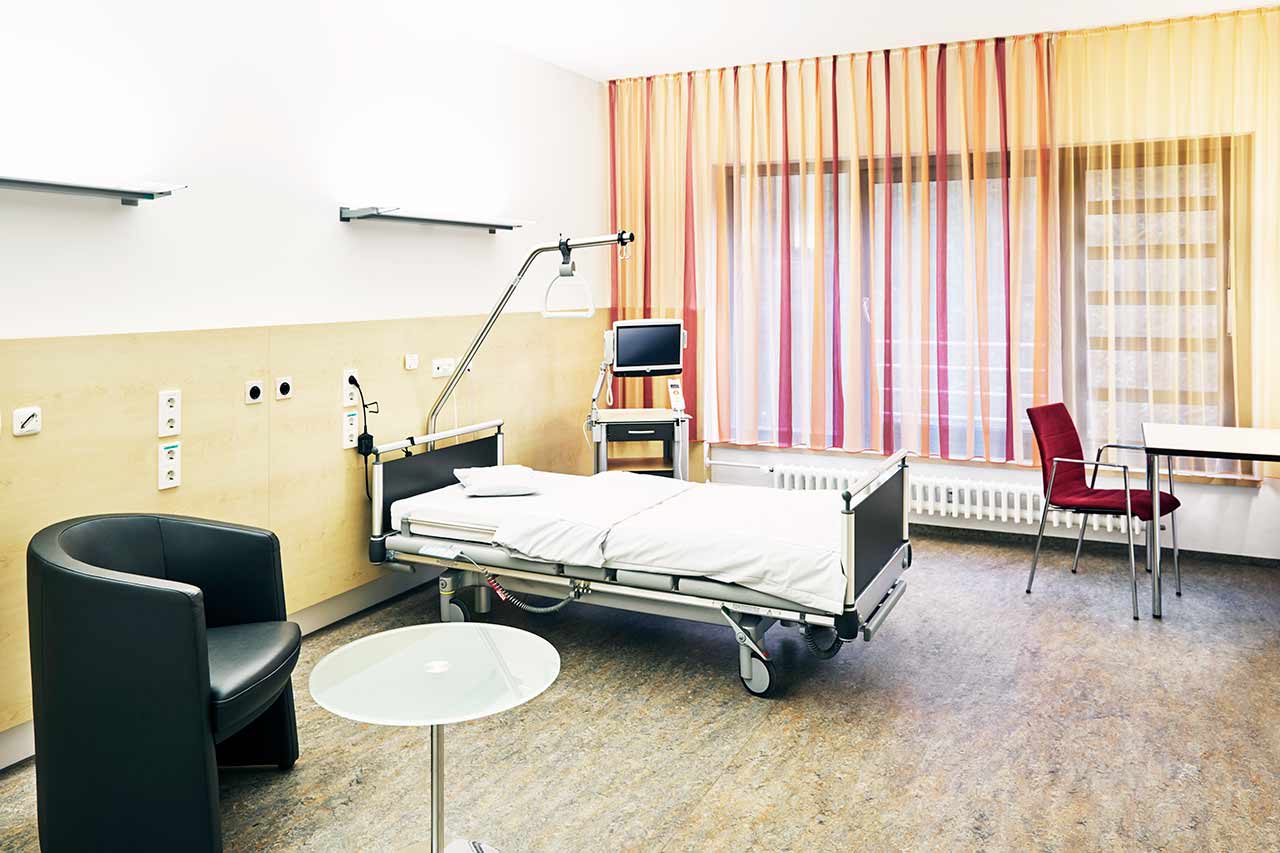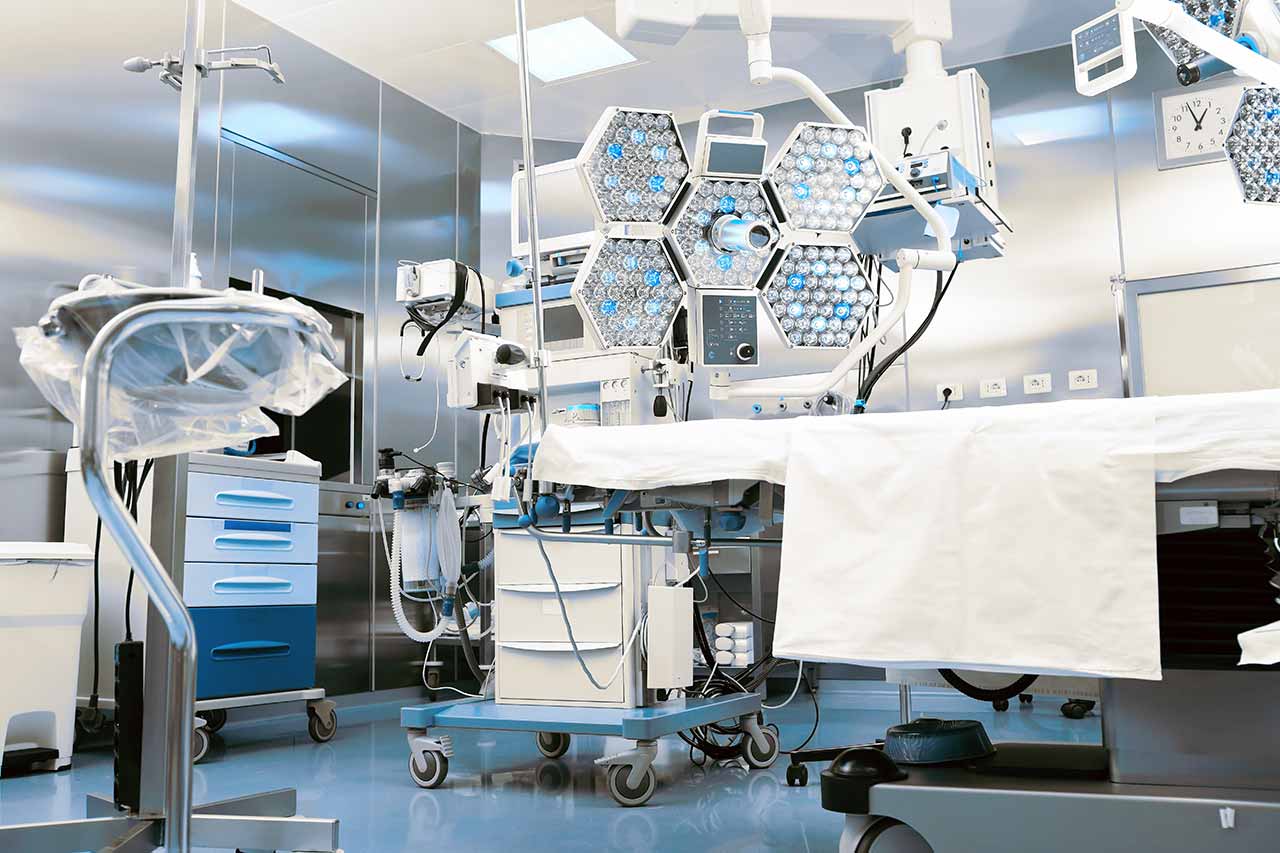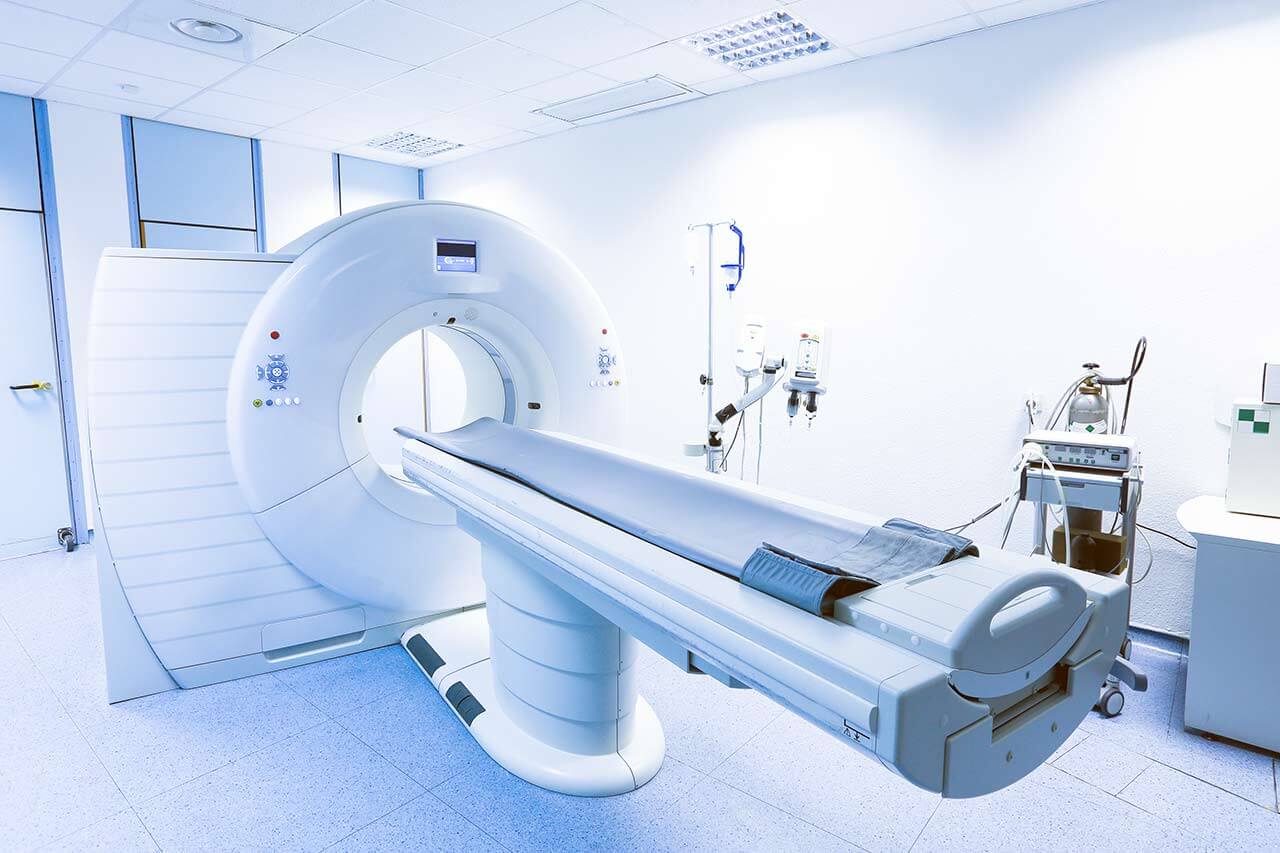
The program includes:
- Initial presentation in the clinic
- clinical history taking
- review of medical records
- physical examination
- laboratory tests:
- complete blood count
- biochemical blood test
- tumor markers (AFP, CEA, СА-19-9, CA 72-4)
- inflammation markers (CRP, ESR)
- blood coagulation analysis (aPTT, PT, INR)
- ultrasound of the abdomen
- gastroscopy (with H.pylori test)
- biopsy with histological and immunohistochemical study (if clinically indicated, additional cost is 2500€)
- CT/MRI of the abdomen (if clinically indicated, additional cost is 650/1200€)
- nursing services
- consultation of related specialists (tumor board)
- treatment by chief physician and all leading experts
- explanation of individual treatment plan
Required documents
- Medical records
- Esophagogastroduodenoscopy (EGD), MRI/CT scan (not older than 3 months)
- Biopsy results (if available)
Service
You may also book:
 BookingHealth Price from:
BookingHealth Price from:
About the department
The Department of Gastroenterology, Hepatology, Endocrinology, Diabetology and Internal Medicine at the Hospital Kassel offers the full range of medical services for the diagnostics and treatment of any gastrointestinal diseases, including pathologies of the liver, biliary tract and pancreas. In addition, the department provides treatment to patients with diabetes mellitus, endocrine diseases and hormonal disorders. Of particular interest is the treatment of gastrointestinal cancers, which is carried out in close cooperation with specialists in the field of general and abdominal surgery, oncologists, radiologists, etc. The department offers advanced rooms for endoscopic diagnostic and therapeutic procedures, which are the "gold standard" of modern gastroenterology. For the outstanding achievements in clinical practice, the department is certified in accordance with DIN ISO 9001:2015. The medical facility is recognized as the certified Colon Cancer Center and Pancreatic Cancer Center, as well as the Diabetes Center. The patients can be provided with both inpatient and outpatient medical care. The highly professional doctors with a wealth of experience and profound specialized training take care of the patients' health. The Chief Physician of the department is Prof. Dr. med. Frank Schuppert.
The department's gastroenterologists specialize in the diagnostics and treatment of diseases of the esophagus, stomach, small and large intestines, liver, biliary tract and pancreas. The primary focus is on colon and pancreatic cancer therapy within the specialized center. If a patient has cancer, his clinical case is considered during the interdisciplinary tumor board, which involves not only gastroenterologists, but also oncologists, radiologists, radiotherapists, surgeons and other specialists. The doctors cooperatively elaborate the optimal treatment regimen, taking into account the patient's particular clinical indications, the type of tumor, its stage, localization, as well as the rate of cancer progression. In the case of detection of pathology at the advanced stages, a surgical intervention is often performed as soon as possible. Should surgical treatment be required, the doctors may use sparing laparoscopic techniques. As with other types of cancer, chemotherapy and radiation therapy are actively used during the treatment. The department's specialists provide treatment in accordance with the current clinical protocols and recommendations of the professional societies.
Diabetology is represented by a highly qualified team of doctors who specialize in the treatment of type 2 diabetes mellitus in adults. Since diabetes mellitus is still an incurable disease, the only therapeutic method remains glucose-lowering therapy. In addition, diet therapy and quitting bad habits (drinking alcohol, smoking, etc.) play a key role in the control of pathology. Therefore, the department offers a special school for patients with diabetes mellitus, the main task of which is to teach patients a new way of life with the disease. The patients are instructed on the use of disposable syringes and syringe pens for insulin self-injection. They are also taught how to store insulin and adjust dosages. The department's nutritionists hold consultations for patients with diabetes mellitus to provide comprehensive information on the proper diet in order to avoid high blood sugar levels and, accordingly, an exacerbation of pathology. If required, the patients are also provided with psychological care.
The department's therapeutic options are complemented by the diagnostics and treatment of endocrine diseases, namely thyroid, parathyroid, adrenal and pituitary diseases. In most cases, comprehensive laboratory diagnostics and ultrasound scanning are sufficient to detect endocrine pathologies. The department's doctors provide only conservative treatment – most often drug therapy. The surgical treatment is provided in collaboration with colleagues from the Department of General, Abdominal and Endocrine Surgery.
The department's range of medical services includes:
- Diagnostics
- Ultrasound scanning
- Classic ultrasound examinations
- Color-coded duplex sonography
- Contrast-enhanced ultrasound
- Ultrasound-guided biopsy for further cytological and histological examinations
- Ultrasound-guided placement of drainage systems
- Transient elastography (Fibroscan®) for liver stiffness measurement
- Endoscopic examinations using high-resolution endoscopes
- Upper GI endoscopy
- Lower GI endoscopy
- Endosonography
- Endoscopic retrograde cholangiopancreatography for the assessment of the condition of the bile ducts and the major pancreatic duct
- Cholangioscopy (endoscopic examination of the bile ducts)
- Proctoscopy
- Rectosigmoidoscopy, colonoscopy, ileocolonoscopy
- Capsule endoscopy
- Double balloon enteroscopy (small bowel examination)
- Functional GI diagnostics (high-resolution esophageal manometry, 24-hour pH test and impedance measurements, functional testing of the anus and rectum, hydrogen breath test)
- Blood sugar testing
- Hormonal tests for the detection of endocrine diseases
- Ultrasound scanning
- Treatment
- Therapeutic endoscopic procedures
- Polyp removal
- Gastrointestinal bleeding arrest
- Treatment of esophageal varices (ligation and sclerotherapy)
- Balloon dilatation and bougienage in stenoses
- Stent implantation
- Percutaneous endoscopic gastrostomy for enteral nutrition
- Proctoscopy for ligation or obliteration of hemorrhoids
- Fecal microbiota transplantation (treatment for recurrent diarrheal diseases caused by Clostridioides difficile)
- Insulin therapy for diabetes mellitus treatment
- Drug therapy for gastrointestinal and endocrine diseases using the very latests drugs
- Therapeutic endoscopic procedures
- Other diagnostic and treatment methods
Curriculum vitae
Prof. Dr. med. Frank Schuppert studied medicine at the Universities of Kiel and Wuerzburg. he underwent training at the hospitals of Paris, San Francisco and Harvard University in Cambridge, USA. The doctor had his professional training in Internal Medicine at the Hanover Medical School, where he also received specialization in Gastroenterology and Endocrinology. He also received here an additional medical qualification as a diabetologist in accordance with the requirements of the German Diabetes Society. In 1996, he had his habilitation and held the position of Senior Physician in the Department of Internal Medicine at the Hanover Medical School.
Since 2000, Prof. Schuppert has been the Head of the Department of Internal Medicine II at the Hospital Bad Oeynhausen, where in 2004 he also held the position of a Medical Director of the hospital. During his work at the Hospital Bad Oeynhausen, he achieved outstanding success – certification of the Department of Endoscopy at this hospital, recognition of the hospital as the Academic Medical Facility of the Hannover Medical School, certification of the Hospital Bad Oeynhausen in accordance with DIN ISO 9001 standards, the creation of a certified Colon Center.
Prof. Schuppert holds many honorary positions, including in the Examination Committee and the Expert Committee of the Medical Association of Westphalia-Lippe, as an expert in the Certification Committee of the North German Society of Gastroenterology.
Photo of the doctor: (c) Klinikum Kassel
About hospital
The Hospital Kassel is a progressive medical facility with a huge medical team, which provides high-quality medical services in all branches of modern medicine. The hospital is part of the regional medical Gesundheit Nordhessen Holding, which unites 5 top-class medical centers, including specialized rehabilitation clinics. With 1,281 beds, the hospital is known as the largest medical complex in the federal state of Hesse. The hospital has 32 specialized departments with highly qualified doctors and specially trained nursing staff in each department. The team of 3,200 employees takes care of the health of patients. The main value for each employee is the patient's health. The professional skills of the medical staff in combination with state-of-the-art medical and technical equipment of the hospital provide excellent opportunities for the treatment of patients with pathologies of any severity.
The hospital provides treatment to over 55,000 inpatients and about 140,000 outpatients every year. Medical care is provided to both German citizens and many patients from foreign countries. Such high rates are the evidence of excellent quality of medical services and the high credit of patients' trust.
The hospital has created a wonderful atmosphere, which contributes to the rapid recovery of patients. All diagnostic and therapeutic rooms, operating rooms, as well as patient rooms are designed taking into account modern standards of European medicine in order to ensure maximum comfort of each patient. All employees working in the hospital provide the patient with understanding and respect, as well as support him in every possible way during the entire therapeutic process.
The hospital successfully implements a quality management system. It uses its own quality management system implemented by the medical Gesundheit Nordhessen Holding, as well as the IQM (Initiative Qualitätsmedizin) monitoring system. As part of healthcare quality management, the hospital annually clearly provides reports on its clinical activities, the success of diagnostics, treatment, level of patient care, etc. Thus, the hospital stands for maximum openness in its work and makes every effort to maintain the highest level of quality of medical care.
Photo: (с) depositphotos
Accommodation in hospital
Patients rooms
The patients of the Hospital Kassel live in comfortable single, double and triple rooms. The patient rooms are made in a modern design and pastel colors. A standard patient room includes an automatically adjustable bed, a bedside table, a wardrobe, a table and chairs for receiving visitors, a TV and a telephone. The patient rooms have Wi-Fi. Each room has an ensuite bathroom with shower and toilet.
The hospital also offers enhanced-comfort patient rooms. Most of these rooms have a balcony. The bathroom additionally includes a hairdryer, towels and toiletries.
Meals and Menus
The patient and the accompanying person are offered tasty and balanced three meals a day. If for some reason you do not eat all foods, you will be offered an individual menu. Please inform the medical staff about your food preferences prior to treatment. The patients staying in enhanced-comfort rooms are provided with an individual menu every day.
The hospital also has several cafes where one can have a cup of tea or coffee, taste delicious pastries, salads, main hot dishes, pizza, etc.
Further details
Standard rooms include:
Religion
The religious services are available upon request.
Accompanying person
During the inpatient program, the accompanying person can live with the patient in a patient room or a hotel of his choice. Our managers will help you choose the most suitable option.
Hotel
During an outpatient program, the patient can stay at the hotel of his choice. Our managers will help you choose the most suitable option.





